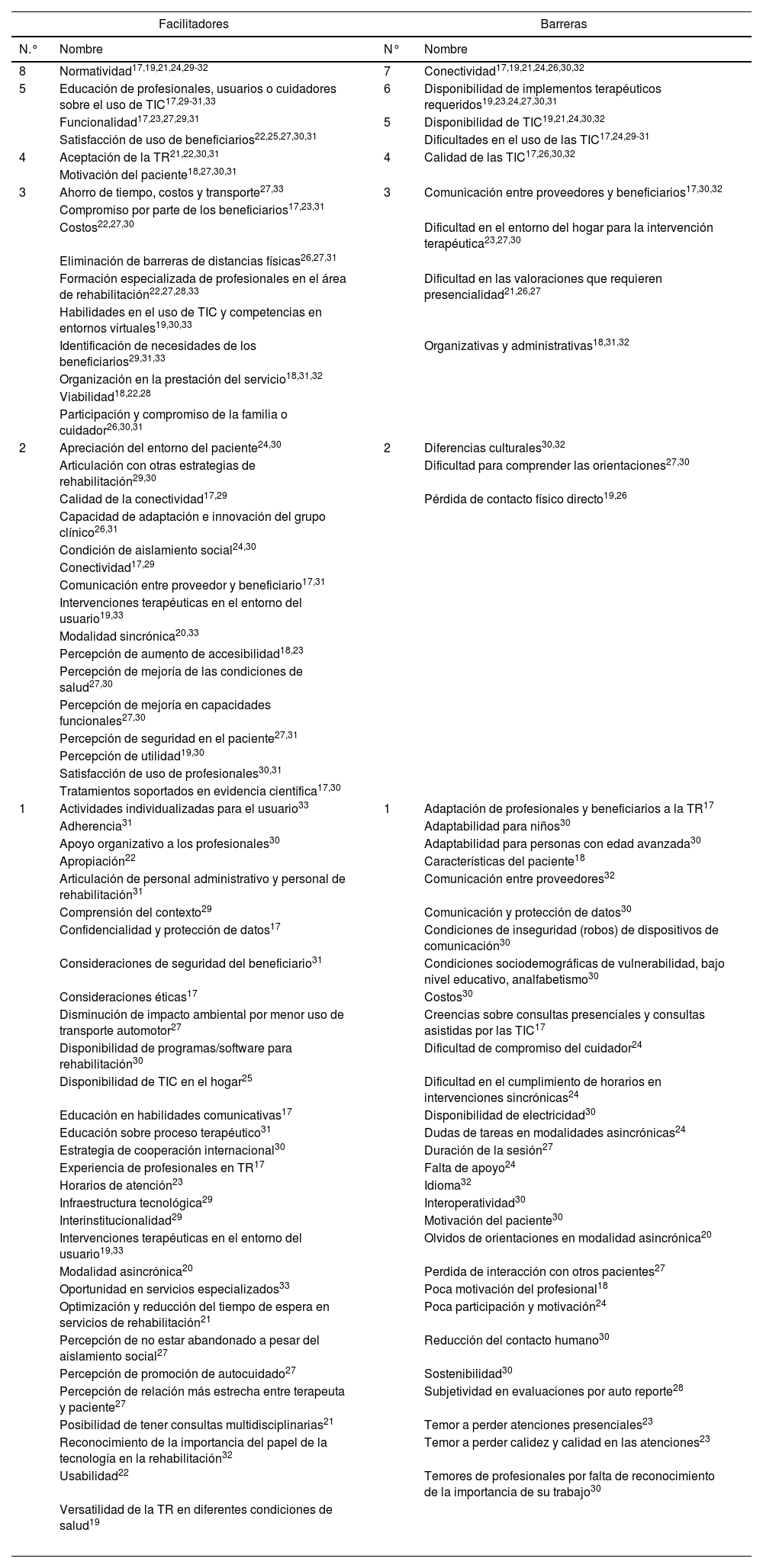La telerrehabilitación (TR) es una modalidad de prestación de servicios que favorece el acceso a la rehabilitación; en Latinoamérica (LA) su implementación amerita investigación para evidenciar estrategias de desarrollo y resultados de impacto.
ObjetivoIdentificar las características, las barreras y los facilitadores para la implementación de TR en LA.
MétodoRevisión exploratoria desde el 1 de enero del 2010 hasta el 31 de diciembre de 2022, en las bases de datos Biblioteca Virtual en Salud BVS; Scielo; Pubmed; Scopus; Web of Science, EBSCO CINAHL y Google Scholar; búsqueda manual y de literatura gris.
ResultadosSe identificaron 17 artículos que reportan procesos de implementación de TR en Brasil, Chile, Colombia, México, Guatemala y Haití. Los escenarios de implementación de TR incluyeron servicios de Atención Primaria en salud, educación e intervenciones terapéuticas. Las barreras más frecuentemente identificadas: falta de conectividad, disponibilidad de implementos terapéuticos, dificultades en el uso de las tecnologías de la información y comunicación (TIC), calidad de las TIC y dificultades organizativas y administrativas. Entre los facilitadores: la existencia de normatividad; la educación de profesionales y usuarios en TIC; la funcionalidad; la satisfacción de uso de los beneficiarios y la aceptación de la TR.
ConclusionesLa TR en LA está emergiendo; la literatura actual revela heterogeneidad en cuanto a poblaciones, escenarios y resultados de implementación. La identificación de barreras y facilitadores contribuye a la implementación de la TR en la región. Existe una necesidad urgente de investigación en implementación de TR para dar respuesta a los desafíos del contexto latinoamericano en diversos escenarios de la rehabilitación.
Telerehabilitation (TR) is a service delivery modality that favors access to rehabilitation; there is a need for research about TR implementation in Latin America (LA) to demonstrate development strategies and impact results.
AimTo identify characteristics, barriers and facilitators of TR implementation in LA.
MethodScoping review from January 1, 2010, to December 31, 2022, using the databases Virtual Health Library (VHL); Scielo; PubMed; Scopus; Web of Science; EBSCO; CINAHL and Google Scholar; also, manual and gray literature searches.
Results17 articles were identified reporting TR implementation processes in Brazil, Chile, Colombia, Mexico, Guatemala and Haiti. The TR implementation scenarios included primary health care, education and therapeutic intervention services. The most frequently identified barriers were: lack of connectivity; availability of therapeutic implements; difficulties in the use of Information and Communication Technologies (ICTs); quality of ICTs; and organizational and administrative difficulties. Among the facilitators
: the existence of regulations; ICT education of professionals and users; functionality; beneficiaries’ satisfaction of use and acceptance of TR.
ConclusionsTR in LA is emerging, and current literature reveals heterogeneity in terms of populations, settings and implementation outcomes. The identification of barriers and facilitators contributes to the implementation of TR in the region. There is an urgent need for research on TR implementation to respond to the challenges of the Latin American context in various rehabilitation scenarios.
Article
Si ya tiene sus datos de acceso, clique aquí.
Si olvidó su clave de acceso puede recuperarla clicando aquí y seleccionando la opción "He olvidado mi contraseña".









